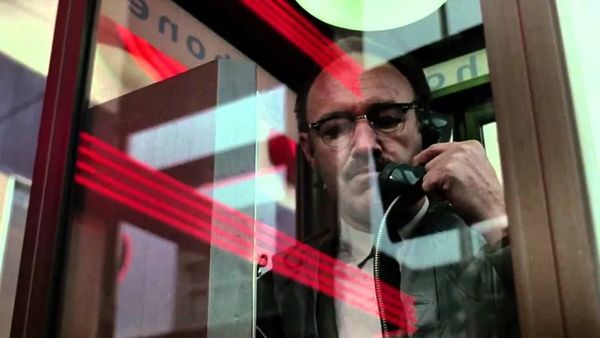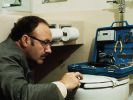Eye For Film >> Movies >> The Conversation (1974) Film Review
The Conversation
Reviewed by: Amber Wilkinson

Sandwiched between the two heavywight, Oscar-winning Godfathers, this film, from an original screenplay by Francis Ford Coppola himself, peddles an altogether more hard-boiled and intimate type of psychological menace and is simultaneously a gripping thriller and mesmerising character study. Although it lost out to Godfather: Part II in the 1975 Oscar hunt, it was critically well received, winning the Palm d'Or at Cannes, and its theme of surveillance and consequences proved remarkably prescient at the time of its release – with the film wrapping just before the major elements of the Watergate scandal broke. Watching it now, more than 30 years later, it feels no less relevant to a modern era where CCTV is a permanent fixture on most of our streets.
Gene Hackman is anti-hero Harry Caul – a lonely, buttoned-up soul with few friends but a lot of technical nous. While struggling to maintain any sort of intimacy with those around him and keep his own paranoia at bay, his skill with electronics means that he can be privy to the inner-most secrets of those he bugs, although he continually protests that it's just business to him and that he has no interest in those he records.

Surveillance, however, is a dirty game and people have been hurt in the past, a fact that weighs increasingly heavily on Caul as he begins to piece together the conversation of the film's title. What starts as a job of recording a couple who are having an affair, soon takes a turn for something much more sinister, with implications both for them and Caul.
Coppola's direction – and Walter Murch's sound design – are masterful from the outset, in a long credits sequence in which a camera slowly zooms in on San Francisco's Union Square as a band plays When The Red, Red Robin Comes Bob, Bob Bobbing Along. Caul is there but in a point-of-view choice that remains throughout, the focus of the action is the thing he is there to capture - a clandestine chat between Ann (Cindy Williams) and Mark (Frederic Forrest). Because they are on the move in a busy place, their conversation is being recorded by several methods and not all of it is audible. It is this ambiguity that forms the crux of the film's thriller element, with Caul working to decipher what is being said beneath the squelch as his fears grow for their safety.
The taught and twisted plotting alone is reason enough to watch but Hackman's depiction of the slowly unravelling Caul makes Coppola's film all the more compelling. His increasingly haunted portrayal gives everything an unsettling edge, while the decision to show the machinations of the thriller plot from purely his point of view sucks us, unwittingly, into his assumptions. An unfeasibly young Harrison Ford puts in a memorable performance as the slimy corporate underling trying to get his hands on the recording and Robert Duval makes his brief – and uncredited – appearance stick in the mind. Elsewhere, Terri Garr steals the single scene she is in with her heartbreakingly upbeat Amy acting as an equally lonely, yet bubbly counterpoint to her closed-off lover Caul. Overlaying the action is that repeated conversation and a mournful, jazz-inflected score by David Shire, which perfectly matches Caul's melancholy air.
Coppola may have made films of a more spectacular nature but here he makes a virtue of a introversion, so that the film's horror moment is all the more vibrantly terrible when set in relief. With its undercurrent of questions about voyeurism and surreptitious scrutiny, Coppola's Conversation has a lot more to say than it might first appear - you just have to listen closely.
Editor's Note: To celebrate it's 50th anniversary, StudioCanal is releasing a 4K restoration of the Palme D’or winner in UK cinemas on July 5. The film will then be available to own via a special 2-disc 4K UHD Collector’s edition and on digital from July 15.
Reviewed on: 06 Nov 2011
















